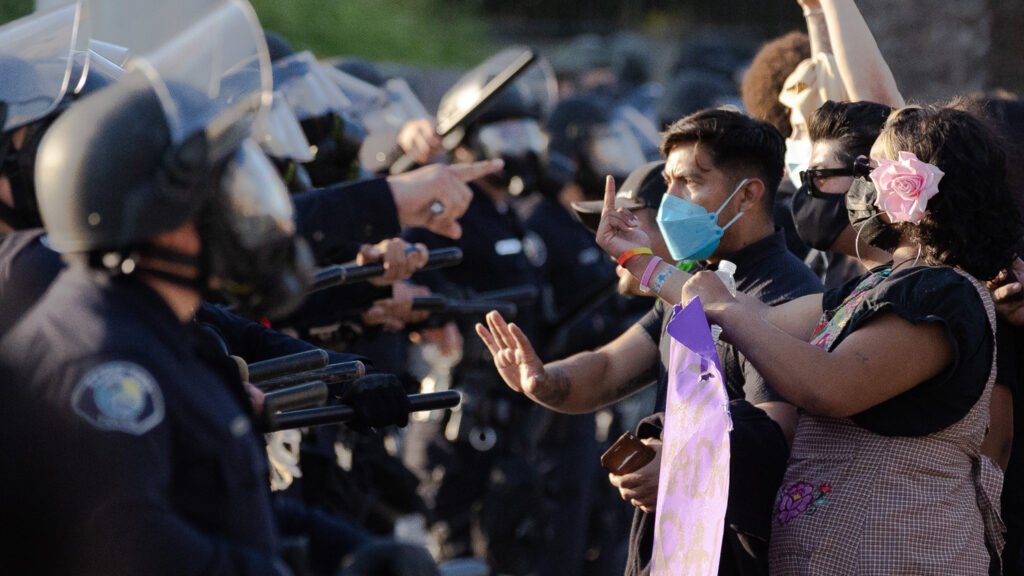At a recent Santa Ana City Council meeting, tensions erupted when a woman was handcuffed by police officers amidst heated discussions over a proposed overhaul of the city’s police oversight commission. This emotional moment encapsulated the growing frustration among community members and activists who feel that their voices are being drowned out by political machinations aimed at shielding police from accountability.
A Shadow Over Accountability: Santa Ana’s Struggle for Police Oversight
A coalition of residents, activists, and city commissioners is sounding the alarm over concerns that elected officials lack the courage to allow external scrutiny of police misconduct in Santa Ana. The stakes have grown higher following the police department’s controversial use of force against peaceful demonstrators protesting against Immigration and Customs Enforcement (ICE) activities, where officers deployed pepper balls and tear gas against citizens expressing their dissent.
Critics of the Santa Ana Police Department argue that the proposed amendments to the oversight commission threaten to dismantle accountability measures that were only recently established. “These amendments don’t improve oversight; they dismantled it,” declared Police Oversight Commissioner Carlos Perea, highlighting both legal and ethical breaches that the community fears. “What you’re seeing is organized. You’re seeing police attempt to run your city,” he added.
Concerns Among Citizens and Activists
The backdrop to this turmoil is a year marked by heightened scrutiny of police practices across the United States, especially in communities of color. The American Civil Liberties Union (ACLU), among other organizations, has voiced strong opposition to the police’s aggressive tactics during protests, calling for transparency and accountability.
- Reports of police using non-lethal projectiles and chemical agents against peaceful protestors.
- Continued lack of clarity regarding the number of projectiles deployed during the protests.
- Concerns that proposed changes will effectively strip the commission of its power.
Some activists argue that the changes would limit the commission’s ability to investigate serious complaints, creating a perception of a “hollow commission.” Jennifer Rojas of the advocacy group Chispa stated, “They create the illusion of oversight while stripping away every tool necessary to hold police accountable. Bad oversight is worse than no oversight at all.”
The Political Landscape
The timing of these proposed changes raises questions about the influence of local law enforcement on city council decisions. City officials have argued that the shifts are necessary for compliance with state laws and to better train commissioners on police practices. However, critics assert that these changes reflect deeper issues within the city’s governance structure.
Councilman Johnathan Ryan Hernandez described the situation as a quid pro quo arrangement, alleging that Mayor Valerie Amezcua caved to pressures from the police union. “It’s to give the police immunity when they shoot your loved one who’s unarmed,” he exclaimed, indicating a troubling intersection between campaign financing and policymaking.
Such assertions are further bolstered by the considerable financial support that the police union has funneled into the campaigns of various council members, casting a shadow over their independence and integrity.
Legislative Changes and Their Implications
City officials adopted the original ordinance establishing the police oversight commission in 2022, with the intention of promoting greater accountability and investing in community trust. This foundation is now under threat, as representatives propose significant changes that may ultimately undercut the power of the commission.
Key proposed changes include:
- Limiting the oversight commission’s ability to investigate serious misconduct until the police’s Internal Affairs unit has concluded its own investigation.
- Stripping the oversight director of powers to subpoena witnesses or compel evidence.
- Reducing access to police records, which would hinder transparent investigations.
- Mandating that commissioners receive training from police personnel, potentially compromising their objectivity.
Amalia Mejia, a police oversight commissioner, criticized the proposed changes, arguing that they contradict the fundamental aim of the commission: “How unreasonable is it to pay $250,000 on salary for an oversight director, but not have a proper commission working to actually address the issues it was intended to?”
Public Sentiment and Future Outlook
A significant portion of the Santa Ana community remains vigilant, concerned that the proposed amendments may not only undermine the commission’s authority but also perpetuate systemic issues within the police department. With residents effectively frozen out of essential discussions regarding their safety and community oversight, anger and frustration are mounting.
“The community should be alarmed that local politics seem to prioritize police unions over public safety and accountability,” said a local activist, who wished to remain anonymous. “Our safety should not be the bargaining chip in political games.”
Despite the cloud of uncertainty that looms over the future of police oversight in Santa Ana, activists, residents, and some city officials are determined to resist these alarming changes. As Perea rightly notes, “We cannot and will not accept a compromised form of oversight that serves to protect those who abuse power.”
Santa Ana finds itself at a critical crossroads, as residents grapple with the resilience of their community against the backdrop of political strife. Whether the push for accountability will be suffocated or upheld remains a pivotal question in the city’s fight for justice and transparency.





